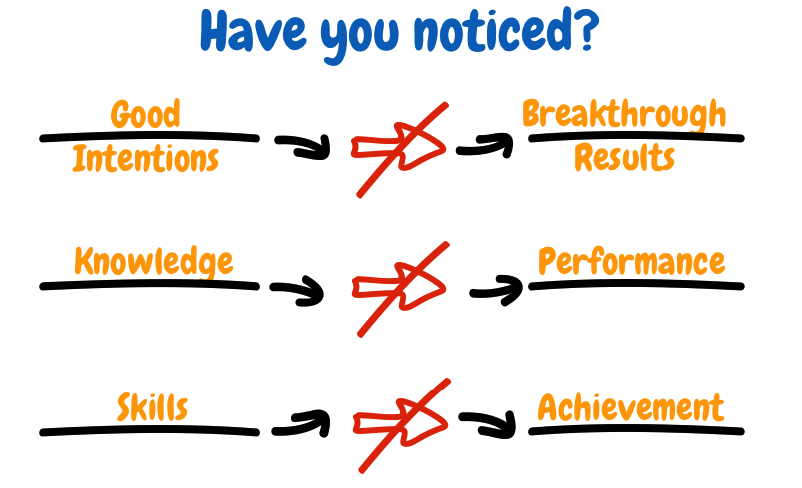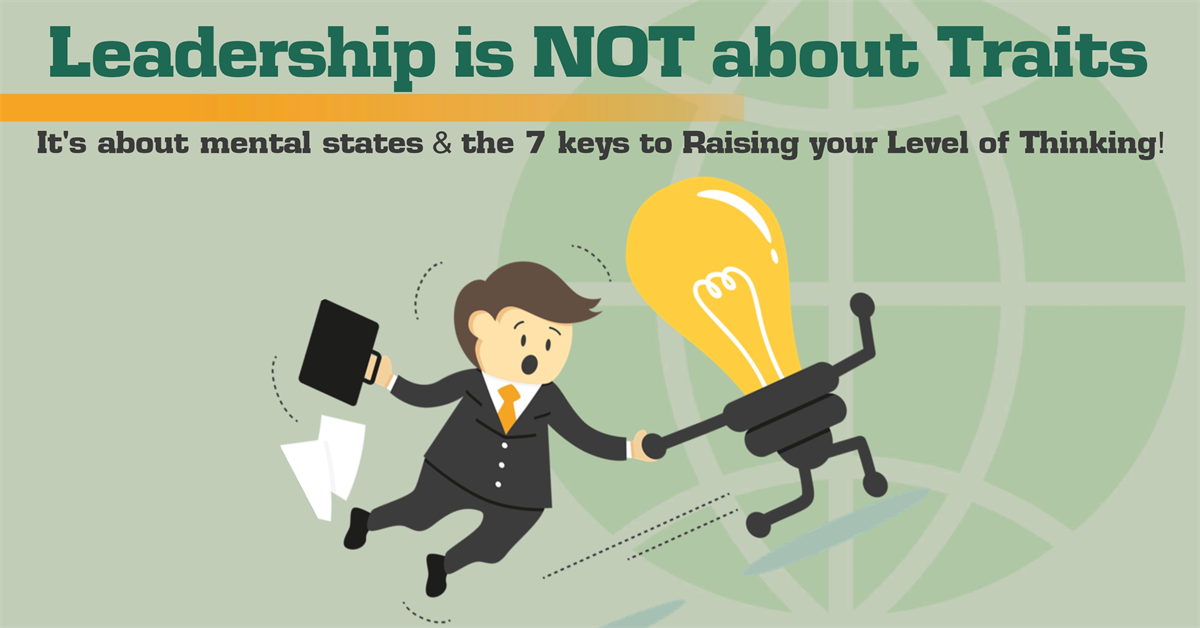Leadership traits and talents are NOT enough…
You’ve probably heard that in order to be a good leader there specific traits that you need. Recently, a book published by Gallup listed 10 traits you need to be a builder and to build a team that accomplishes its goal. The leadership book is written by Jim Clifton, who is the CEO of Gallup, and Sangeeta Badal. They, just like others before them, have taken a look at the research and compiled this list of 10 characteristics or traits of successful leaders. What’s that list?
In this article, they say that every builder uses some mix of these 10 talents:
- Confidence: You accurately know yourself and understand others.
- Delegator: You recognize that you cannot do everything and are willing to contemplate a shift in style and control.
- Determination: You persevere through difficult and seemingly insurmountable obstacles.
- Disruptor: You exhibit creativity in taking an existing idea or product and turning it into something better.
- Independence: You do whatever needs to be done to build a successful venture.
- Knowledge: You constantly search for information that is relevant to growing your business.
- Profitability: You make decisions based on the observed or anticipated effect on profit.
- Relationship: You possess high social awareness and an ability to build relationships that are beneficial to your organization’s survival and growth.
- Risk: You instinctively know how to manage high-risk situations.
- Selling: You are the best spokesperson for your business.
But wait…
- In this article at Forbes.com, author Deep Patel says that there are 11 Powerful Traits Of Successful Leaders
- In an article on Inc.com, Lolly Daskal says that there are 5 Leadership Skills You Must Have to Succeed
- The folks from Air University, the leadership center of the US Air Force, lists 8 traits you must have to lead and then 6 more that you need to motivate others.
- and then there is an article by Brian Downard that lists 101 of the Best Leadership Skills, Traits, and Qualities.
YES, leader (that’s you), you have a LOT of work to do!!
It’s not about the traits…
Yet, you’ve probably followed great leaders who didn’t possess all of these stated traits, qualities, and characteristics, right? Some you may even follow to the ends of the earth. OR, you may be that leader that others would willingly follow anywhere. But, it’s not about your traits. It’s more than that.
It’s analogous to my talks at project management and leadership conferences. In the project world, the traits of successful project delivery are mainly 3 things: a) on-time, b) on-budget and c) within the agreed-upon scope. Those are the 3 main traits of a successful project. So, then I ask the hundreds or thousands of audience members to raise your hand if you’ve ever delivered a project that was on-time, on budget and within scope that was deemed UNsuccessful? 40-60% of the hands in the audience go up. Next, I ask, how many of you have delivered a project that was NOT on-time or NOT on budget and/or NOT within scope that was deemed successful? Even more hands go up!
Really? You are judged, evaluated, and measured on on-time, on budget and within scope. How is it possible that those 3 at times don’t equal success?
I believe that it’s not all about the traits or characteristics.
FREE Content-filled WEBINAR
Learn the 7 Keys to Your Best Leadership States

May 14, 2018 at 11:30 AM CDT / 12:30 PM EDT / 9:30 AM PDT
![]() We value your privacy and would never spam you
We value your privacy and would never spam you
It’s all about the states!
While the traits are important, there are things that are MORE important or valuable. It’s the same thing with leadership. You can list your 5, 8, 11, or 101 traits and even if you were to acquire all of them, would your leadership be successful?
Yes, traits, behaviors, and characteristics are important but it is your mental state that trumps your traits.
Think about it… you know HOW to do something. For instance, you know how to eat better, or you know how to motivate or treat people better, but you don’t do it. Why? You may think that it’s because of your personality traits or your innate characteristics. You may blame it on your circumstances or justify it with excuses and rationalizations. Yet, that’s not completely true because you also know that you COULD eat better or treat people better if you wanted to do so. What’s getting in your way? Your mental state.

We have been led to believe that if we aren’t successful that we have to go learn a new skill or new talent or new trait. We end up on this endless cycle of learning and learning and then not doing or implementing.
Has this ever happened to you?
 You go to a conference or a training and you learn a lot of terrific stuff. You place stars, asterisks, and highlights on your notes and make bold statements to yourself: “This is great stuff. I’m going to do this!!!”
You go to a conference or a training and you learn a lot of terrific stuff. You place stars, asterisks, and highlights on your notes and make bold statements to yourself: “This is great stuff. I’m going to do this!!!”
You put action items on your to-do list. You think of where all of this information is going to help you and you can envision days, weeks, months down the road where you are achieving great things because of this information.
Then, you get back to the office and never look at your notes and don’t implement anything. You’re busy, after all. One day, you think to look back because you remember circling some information but you aren’t able to find it or when you do, it doesn’t seem nearly as good as it did at the training or conference. Sound familiar?
It’s not only about the knowledge, skills, talents, and characteristics.
How you think determines what you do.
Albert Einstein said,
“You can not solve today’s problems from the same level of thinking you were at when you created them.”
George Bernard Shaw said,
“Progress is impossible without change, and those who cannot change their minds, cannot change anything.”
In order to implement the things that you learn, in order to master new traits, and utilize your talents, you need to RAISE YOUR LEVEL of THINKING!
7 Keys
There are 7 keys to raising your thinking. You must understand an incorporate the following:
- Mindfulness
- Mindset
- Value Dynamics
- Your Valuing / Thinking Habits (Assets and Biases)
- Purpose
- Power
- Plan
I will be covering all 7 of these key steps in a free web event!
Go to https://pmbrilliance.com/7keys to register TODAY. You don’t want to miss out!
Don’t take my word for it…
Here's what Cari had to say...
Hi Traci. I got so much out of your webinar.
The biggest thing for me was how simple and straightforward your examples are. Makes it really easy to consider all aspects of my life – work and personal.
A couple of the things I noted:
- Mindfulness – how important it is to try to quiet your mind to give you more clarity; the two suggestions you gave to us to do this really are simple – imagine something truly awesome or “I wonder…”
- Mindset – fixed vs growth mindset – the examples of each area were very easy to digest; that makes it easier to really evaluate my mindset for each area.
- Value Dynamics – the fact it is mathematical-based and not psychological-based; intrinsic vs extrinsic vs systemic priority – really reiterates that the product is more important than the process (of course intrinsic is most important)
- Valuing Habits – I didn’t realize how much of our behavior is impacted here – 90%. I knew it was high, just not that high.
- Purpose – What are you working on? What are you working for? What do you want to become? These questions really boil it down.
- Power – it’s less about power and more about owning your power and not letting others own it
- Plan – Last, the analogy of till the soil, plant the seeds and harvest the results gives a very clear picture.
Often workshops/course/material about focusing on yourself can be daunting when you think about what’s next and how to leverage the information…not this. It left me feeling very confident I can take this forward.
----
Thanks,
Cari
Go to https://pmbrilliance.com/7keys to register TODAY.

